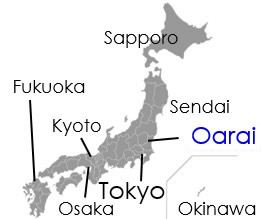The International Research Center for Nuclear Materials Science (the “IRC”) of the Institute for Materials Research of Tohoku University had its beginnings on 1 April 2004 as the new name of its Materials Testing Reactor Facility predecessor (established in 1969). As described below, the IRC is focused on human resources development and advancement of scientific and technological research together with its inheritance of the main operations of national collaborative usage and other operations performed at its predecessor, in conjunction with research internationalization and other avenues of development.
Nuclear energy is a key to energy supply in Japan. It meets over 30% of the need for electricity, with more than 50 domestic reactors. Research on the life span and properties of nuclear energy materials relating to their safety is essential for the safety and security of the human operators of these reactors. This materials research is performed at the IRC, utilizing the advanced materials science methods of the Tohoku University Institute for Materials Research.
Another key focus is research on materials for future fusion reactors and other energy sources.
Research is also focused on safe processing and disposal of spent nuclear fuel from the reactors. A central pillar of research in parallel with materials research at the IRC is discovery of new substances from actinides, depleted uranium, and other actively used materials and determination of physical properties basic to that research.
Concurrently with this research, the IRC serves as an all-Japan collaborative usage facility for researchers from universities and research institutions throughout the country. It supports collaborative usage and it actively advances collaborative research.
Development of human resources holds the key to the future of nuclear energy. The IRC plays a major role in this development, through research for degree earning by graduate students and summer intensive student practice, through its enhanced system of visiting professors and faculty, and its continuing advancement of education and training.
Development of the international dimension is vital for maintaining a high level of research, sharing information and research technologies, and heightening research efficiency. The IRC concludes research agreements and other accords with world-leading research institutions and engages with them in exchange of human resources, samples and materials, and information. Irradiation facilities are particularly important in research on nuclear energy. In addition to the current use of the material test reactors and the Joyo fast breeder reactor of the Japan Atomic Energy Agency (JAEA), IRC will further engage in irradiation tests utilizing overseas nuclear reactors and related facilities.
In another important function, the IRC serves as a domestic base for international cooperation of universities and other entities for the advancement of materials irradiation research. The IRC has also played a major role in the Jupiter-II project of Japan-United States cooperation in science and technology and the field of fusion, and will play a leading role in a growing scope of efforts for international cooperation.
Close coordination and cooperation with the JAEA is essential to these efforts. To maintain the visiting professor and other systems in particular, it is vital to further strengthen an organic cooperative relationship.
In advancing university-industry-government cooperative operation and cooperation with local entities, the IRC will work to return the benefits of research to society.


